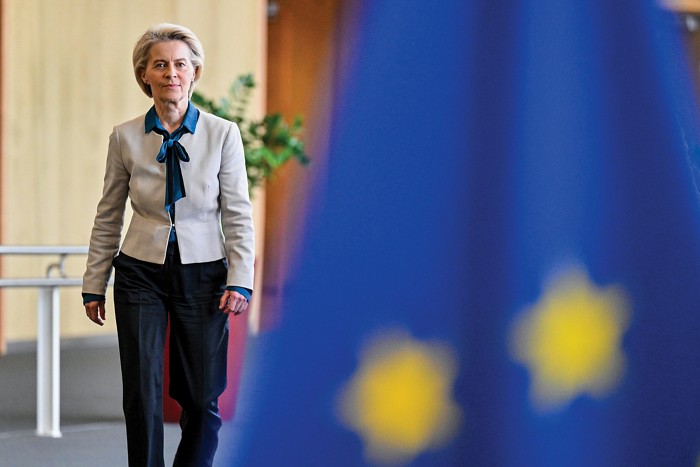Credit: Associated Press
A rescue plan for Europe’s chemical industry championed by European Commission president Ursula von der Leyen (pictured) falls short of what is needed, the industry says.
An action plan unveiled recently by the European Commission (EC) to strengthen the European chemical sector will not stop the ongoing closure of chemical plants across the region, companies and industry groups say.
“The Chemical Industry Action Plan is too little, too late,” Tom Crotty, director of corporate affairs for the UK-based chemical maker Ineos, says in a press release. “It fails to address the real issues, while the US and China race off with the keys to our industrial base. Europe talks, they act, and that’s why investment, innovation and jobs are packing their bags and heading elsewhere.”
The plan fails to tackle the two most immediate threats to the survival of Europe’s chemical industry: the high cost of natural gas and the escalating cost of allowances for carbon emissions, Crotty says.
Unveiled last week, the EC’s action plan is intended to resolve the European chemical industry’s core problems of high energy costs, unfair competition, and weak demand, while encouraging investment in innovation and sustainability.
The Plan fails to tackle two of the most immediate pressing threats to the survival of Europe’s chemical industry.
Tom Crotty, director of corporate affairs, Ineos
To prevent unfair competition, the EC plans to create the Critical Chemicals Alliance—an organization representing both industry and EU member states—to put trade defense measures in place. The EC is also proposing the swift implementation of its Affordable Energy Action Plan to ensure energy is available at a competitive price. And the EC says it will introduce tax breaks to encourage investment in green chemistry processes.
To ease the regulatory burden on the industry, the EC is working on the Sixth Omnibus, a package of measures to streamline and simplify EU chemical legislation. It is set to save industry at least $420 million annually, EC says.
Two of the most effective measures available to the EC, tariffs and quotas, need to be applied swiftly, says Richard John Carter, an independent consultant and former senior executive at BASF. “The other measures announced regarding—for example—affordable energy, decarbonization, and innovation will take many years to implement,” he says.
Indeed, European chemical industry associations are skeptical about the ability of the EC’s plan to move the needle on the industry’s global competitiveness. “A start has been made,” Markus Steilemann, president of VCI, Germany’s largest chemical industry association, says in a press release. “The coming months will determine whether this initial step will become a powerful path to reform.”
Germany’s chemical industry is especially exposed to high prices for natural gas and electricity as well as the cost of allowances for carbon emissions, says Peter Hartl, a partner at the consulting firm Horváth and Partner. In Germany, the EC’s action plan “will not be enough to close the gap to global competition,” he says.
The action plan is one of several building blocks that the European Chemical Industry Council (Cefic), a trade group, says the European industry needs if it is to survive. Other components include clarity on policies relating to plastics recycling, green hydrogen, critical chemicals, and natural gas prices, Marco Mensink, Cefic’s director general, says in a press release.
The EC has said on previous occasions that it will support the chemical industry, but any such support up until now doesn’t seem to have been effective. Cefic estimates that 5% of Europe’s chemical production capacity was shut down in 2023 because it was uncompetitive. More plant closures followed in 2024, and more have been announced this year.
The European chemical industry says the right way forward is in its own package of proposals for policy change, named the Antwerp Declaration and published in February 2024. “The solution is known,” Cefic says.
Chemical & Engineering News
ISSN 0009-2347
Copyright © 2025 American Chemical Society
